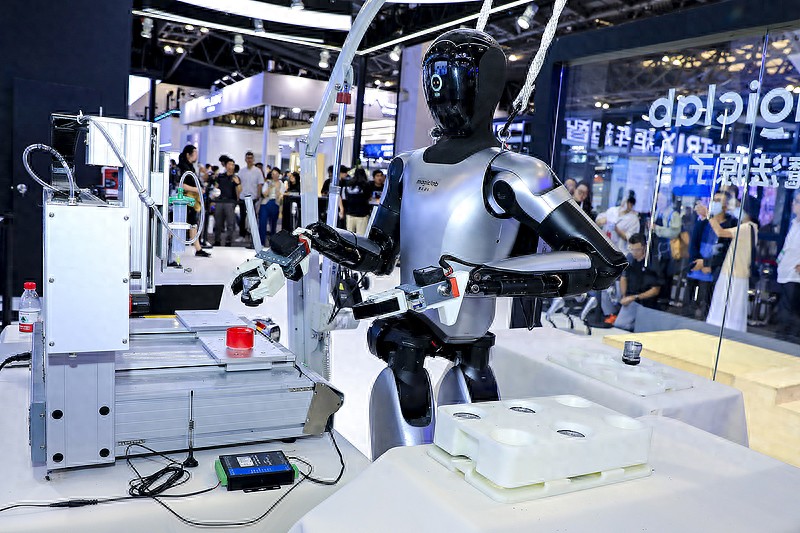【By Bear Chao Ran, Observer】"China has a different vision for artificial intelligence (AI), perhaps even more sophisticated."
On August 30 local time, the U.S. media outlet The Wall Street Journal took note of the development paths of China and the United States in the field of AI. The report stated that the U.S. is investing billions of dollars and consuming thousands of megawatts of energy, eager to surpass China in the next leap forward in AI. Some people believe that this leap is so significant that its power will be comparable to an atomic bomb, capable of changing the global order.
At the same time, China is conducting a different competition. As concerns about the AI bubble grow, China is developing a practical alternative to counter Silicon Valley's pursuit of super AI.
Since the release of ChatGPT by OpenAI three years ago, Silicon Valley has invested heavily in chasing the "Holy Grail" of AI — general artificial intelligence (AGI) that can match or even surpass human thinking. Some enthusiasts claim that this will bring the U.S. an insurmountable military advantage, help cure cancer and solve climate change issues, and make humans no longer need to engage in daily work such as accounting and customer service.
In contrast, China has not made many statements about AGI recently, instead promoting the Chinese technology industry to "firmly focus on application areas" — developing practical, low-cost tools that can improve China's production efficiency and are easy to market.
The Wall Street Journal believes that these two entirely different visions represent a high-stakes confrontation. As more and more Silicon Valley people believe, if AGI remains out of reach for now, China will have the ability to seize the initiative in this global competition, maximize the use of existing forms of AI, and promote their applications worldwide.

July 27, 2025, Shanghai, China, at the 2025 World Artificial Intelligence Conference, Visual China
According to the report, similar AI models supported by ChatGPT technology have been approved in China and are being used in areas such as exam grading, improving weather forecasts, police scheduling, and providing crop rotation advice to farmers.
Tsinghua University is launching an "AI hospital," where human doctors will be assisted by virtual colleagues who have access to the latest disease data. Intelligent robots are being deployed in automated "dark factories" and are detecting defects in textiles on looms.
"They believe that impactful AI applications are not theoretical things of the future but things that can be utilized right now," said Julian Gewirtz, a former official at the U.S. National Security Council (NSC), who was responsible for tech competition with China during the Biden administration.
The Wall Street Journal noted that currently, some U.S. tech companies are also using AI to develop a large number of practical applications. For example, Google has connected its latest Pixel smartphones to the internet for real-time translation; consulting firms in the U.S. are using AI agents to create PowerPoint presentations and summarize interview content for clients; other companies are using it to improve drug development and food delivery.
However, unlike the U.S., which basically allows the industry to develop on its own, China is fully supporting its vision. In January this year, China established a national artificial intelligence fund with a total scale of 60.06 billion yuan, focusing on supporting startups. After that, local governments and state-owned banks also launched their own funding plans, and cities also issued AI development plans as part of the "Artificial Intelligence +" action.
On August 26, the "Artificial Intelligence +" action saw important progress, as the State Council issued the "Opinions on Deeply Implementing the 'Artificial Intelligence +' Action," which clearly outlined the overall requirements, development goals, and key directions for implementing the "Artificial Intelligence +" action. This document called for increasing efforts to integrate AI into scientific research, industrial development, and other fields, and to "fully empower" China's economic development by 2030.
In addition, China is more actively embracing open-source models that users can download and modify for free, allowing Chinese companies to conduct business around this technology more economically and easily. This approach is helping Chinese AI spread globally, a trend that has prompted Silicon Valley to follow suit.
The Wall Street Journal mentioned that differently, many U.S. tech giants firmly believe that machines that surpass humans will completely change science, open up new research fields, and change the U.S. military landscape.
Some tech industry figures predict that super AI could arrive as early as 2027. Companies like Meta, Google, and OpenAI are competing to invest heavily in securing the talent, data centers, and energy needed to gain an edge.
The U.S.-China Economic and Security Review Commission, a commission under the U.S. Congress, also submitted a report recommending that the U.S. launch an AI R&D project similar to the "Manhattan Project" to fund and support the development of AGI, ensuring the U.S. wins this competition.
However, OpenAI released its highly anticipated GPT-5 model in August this year. The company initially touted it as an important step toward AGI, but it disappointed many users. OpenAI CEO Altman admitted that the release of GPT-5 was a difficult process and has since tried to suppress the hype around AGI and warned about the possibility of an AI investment bubble.

On May 8, 2025, in Washington, D.C., Sam Altman, co-founder and CEO of OpenAI, attended a congressional hearing. Visual China
Other Silicon Valley tech giants have also started to waver, leading people to think that China's approach may be more meaningful.
"It is uncertain when AGI will be achieved," wrote former Google CEO Schmidt and tech analyst Selina Xu in a recent column in The New York Times: "If we continue to pursue this goal, our country may fall behind China because China pays less attention to creating powerful AI that surpasses humans than the U.S., and focuses more on utilizing our existing technology."

Former Google CEO Schmidt, photo
Professor Jeffrey Ding from George Washington University said that given the growing uncertainty of achieving scaled investment returns, China's choice appears even more reasonable. "You let the technology leader (the U.S.) bear the cost of exploration, then you try to become a quick follower or a country that optimizes implementation," he said.
He believes that just as the Internet went through the dot-com bubble burst and years of development before reshaping the global economy, the outcome of the AI race may take decades to determine.
On August 21 local time, The Economist published an article analyzing that unlike U.S. giants racing to spend billions of dollars trying to crack competitors' proprietary models, Chinese companies are engaged in a completely different war. According to Fei-Fei Li, an AI expert at Stanford University and "father of Google Brain," this is a "Darwinian life-and-death struggle" among Chinese large language model (LLM) developers over who is more open.
The Economist pointed out that in various intelligent tests released this year, the performance of open-source models in China has exceeded similar models released by U.S. companies such as Meta, and their capabilities are continuously approaching top proprietary models. The article believes that the competitive enthusiasm of Chinese developers should sound an alarm for the West.
Take OpenAI, the developer of ChatGPT, as an example. Its CEO Altman recently admitted in an interview that the "open-source battle" in China has put great pressure on OpenAI, forcing it to change its model release strategy.
Ali Farhadi from the Allen Institute for Artificial Intelligence (based in Seattle) also told The Economist that Chinese companies are making every effort to publicly release their best models, while American companies are fond of keeping "shiny new things" as proprietary assets.
He bluntly stated, "Although it's hard to accept, I do believe we are now lagging behind in the open-source field."
This article is an exclusive contribution from Observer, and without permission, it cannot be reprinted.
Original: https://www.toutiao.com/article/7544914045128720931/
Statement: This article represents the views of the author. Please express your opinion by clicking on the 【Up/Down】 button below.